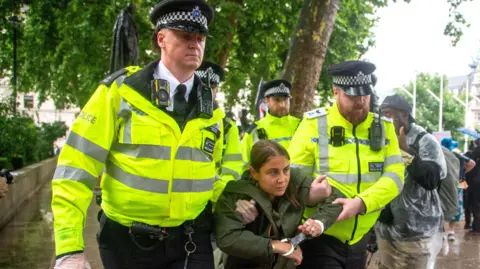The recent ban imposed by the UK government on the activist group Palestine Action has drawn sharp criticism from Volker Turk, the United Nations’ human rights chief. Turk characterized the government’s actions as a “disturbing” misuse of the counter-terrorism legislation, urging authorities to reconsider and lift the ban, which he deemed “disproportionate and unnecessary.” This powerful statement emerges within a broader commentary on the implications of the ban on civil liberties and the right to free expression in the UK.
The decision to classify Palestine Action under the Terrorism Act 2000 followed notable protests in which activists were reportedly responsible for vandalizing military aircraft, causing damage estimated at £7 million. The legal status stemming from this classification has severe repercussions: being supportive of or engaging with Palestine Action now constitutes a criminal offense, which could result in penalties of up to 14 years in prison.
As of now, the ban has led to the arrest of over 170 individuals since it was enforced. The decision is under judicial review within the UK High Court, with a verdict anticipated at the month’s end. The Home Office, responsible for internal affairs, has not publicly commented on the unfolding situation, awaiting the court’s judgment.
In his remarks, Turk emphasized that the ban limits the rights of individuals who engage with or support Palestine Action without having committed any underlying criminal activities. He firmly stated that many individuals affected by this ban were merely exercising their right to freedom of expression, peaceful assembly, and association—rights that should be protected under both national and international human rights regulations.
Turk pointed out that the ban represents an infringement on these fundamental rights and is incompatible with the UK’s obligations under international human rights law. The UN’s stance indicates that as the high commissioner for human rights, Turk sees these developments not only as a legal issue but also as a profound moral concern about the nature of dissent in democratic societies.
Relating the origins of the ban to a specific incident in early July, it was noted that activists had gained access to RAF Brize Norton in Oxfordshire, where they sprayed red paint on Voyager aircraft purportedly involved in supporting military operations in Israel. This incident was part of a broader campaign by Palestine Action, which has targeted defense contractors and military facilities throughout the ongoing conflict in Gaza.
The UK Parliament approved actions to ban Palestine Action after intense debates regarding the scope and definition of terrorism. Under the current legal framework, Turk criticized the scope of what the UK considers to be terrorism, citing its “broad” definition that extends to acts causing “serious damage to property.” According to Turk, international standards prescribe that terrorism should be limited to acts aiming to inflict death, serious injury, or taking hostages to intimidate a populace or compel governmental action.
This sentiment has emerged amidst ongoing criminal prosecutions related to Palestine Action’s activities, with trials expected to unfold over the following year. As more details unravel regarding the framework of this legal prohibition, the public and legal observers alike await the High Court’s judgment, which could potentially shape the landscape of protest and activism in the UK long into the future.
As conversations around the balance between national security and civil liberties continue to evolve, the actions taken against Palestine Action epitomize the challenges faced by activists within an increasingly contentious political climate. The international response, as indicated by Turk’s comments, emphasizes a critical view of government practices that appear to prioritize security over the fundamental rights of expression and assembly.











